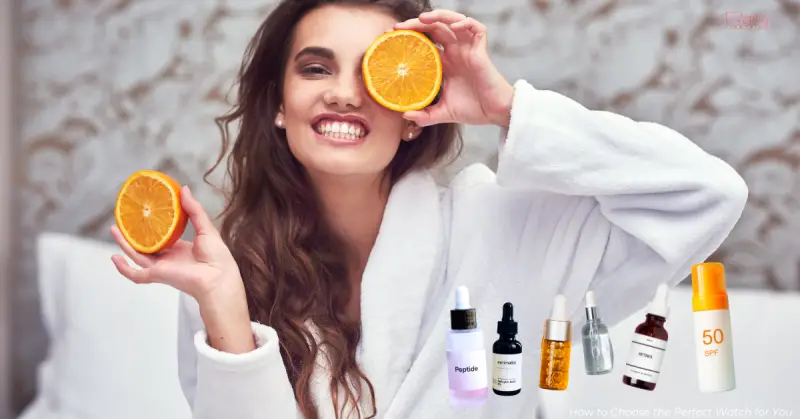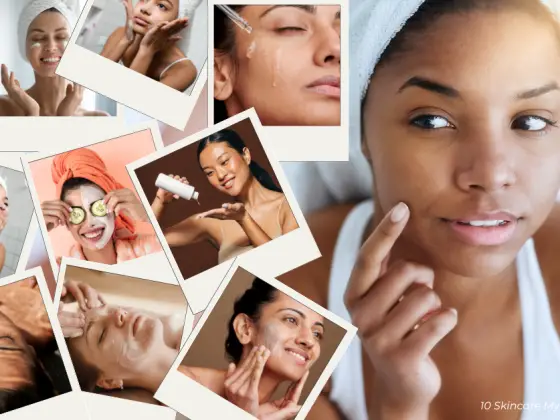
Various online ads claim to offer the best anti-aging cosmetic products, but many tend to exaggerate their promises with results that seem too good to be true. Some brands showcase their product ingredients without genuinely understanding their purpose. These bold claims make it easy to feel overwhelmed, especially when paired with glowing testimonials and celebrity endorsements. However, choosing the proper skincare routine for a youthful complexion shouldn’t be about following the hype.
While some of these claims might hold truth, focusing on proven anti-aging ingredients is essential. Understanding what works will help you make informed choices and achieve long-lasting, effective results for younger-looking skin.
- Anti-aging products vary depending on your sensitivity
- Your expected results will take some time to achieve
What is Anti-Aging?
Before getting to the list, let’s talk about what anti-aging is. “Skin aging” is a term that constantly pops up in beauty products and treatments. However, let’s break it down in a way that makes sense.
First and foremost, aging is a natural and inevitable aspect of life. It affects everyone, and although we might prefer to ignore it, those fine lines and wrinkles are a normal part of aging. But don’t worry—there’s no magical ingredient or treatment that’s going to erase these signs. Instead, what we can do is focus on maintaining and nurturing our skin to keep it looking its best.
So, what’s happening to our skin as we age? As we get older, our skin goes through a few changes. Over time, the proteins collagen and elastin, vital to maintaining our skin’s firmness and elasticity, start to break down. It is why our skin might lose some plumpness and start sagging. Plus, the natural production of these proteins slows down, so our skin can become less resilient over time.
Another factor is the gradual decrease in skin cell turnover. When we’re younger, our skin regenerates quickly, but as we age, this process slows down. It can cause an accumulation of dead skin cells, resulting in a duller appearance of our skin.
Also, let’s remember the role of environmental stressors like sun exposure, pollution, and even lifestyle habits. All these can accelerate the aging process by causing damage to our skin cells and increasing oxidative stress.
The Science of Anti-Aging
Our skin acts as a shield, constantly fighting environmental stressors like UV rays and pollution. Over time, this battle takes a toll, leading to visible signs of aging, such as fine lines, wrinkles, and a loss of radiance. As we age, the body’s natural production of collagen and elastin, the proteins responsible for keeping skin firm and elastic, diminishes, resulting in sagging and wrinkles.
Aging also involves telomeres, protective caps at the ends of chromosomes that shorten with each cell division. When these telomeres become too short, the cells stop dividing and enter a “retired” state, contributing to aging. While breakthroughs in anti-aging treatments are still evolving, effective ways exist to slow the process. Ingredients like retinol, vitamin C, and hyaluronic acid can help maintain youthful skin, sun protection, and a healthy lifestyle.
In short, aging is inevitable, but healthy skin practices are essential for maintaining a youthful appearance. Understanding how collagen, elastin, and telomeres affect skin aging and incorporating effective skincare ingredients can help preserve your skin’s glow. Now, explore the top anti-aging ingredients to include in your skincare routine.
Top 8 Proven Anti-Aging Ingredients
1. Retinol For Nighttime
When looking for cosmetic solutions, look for retinol products. This active anti-aging ingredient smooths and rejuvenates dry skin. In addition, this type of retinoid can help with fine lines and wrinkles.
This compound has a brightening effect that removes and replaces your dead cells. It also promotes collagen production and eliminates clogged pores. A dermatologist says collagen is vital for keeping our bodies hydrated and glowing. In case you don’t know yet, pores are those tiny openings in your face (if you have any). You can get clogged pores when they get trapped in unwanted dirt, dead cells, or oil. Because of retinol’s benefits, it allows you to remove blackheads and whiteheads. Additionally, partner it with moisturizer every night to maximize its benefits and get extra protection.
2. Vitamin C For Daytime
When we were kids, we understood how ascorbic acid helped boost our immunity. Beauty treatments also use it because of its youthful features.
The benefits of these common age-defying elements are similar to retinol. Vitamin C removes wrinkles and fine lines as we age. They can prevent this by helping produce more collagen in our bodies. Our system already generates collagen. Yet, imagine how this nutrient could enhance their production.
Vitamin C is also a powerful antioxidant. Aside from collagen production, it also reduces age spots and sun damage. This anti-aging property in your cosmetic product likewise prevents melanin production. This study published in 2020 mentioned that Vitamin C treats hyperpigmented spots on the epidermis. Therefore, you commonly see it in various cosmetic items like sunscreens, serums, and moisturizers.
Friendly Tip: Apply Vitamin C products during the day rather than at night. Conversely, wear retinol only at night rather than during the day.
3. Hyaluronic Acid for Hydration
Hyaluronic Acid (HA) is one of the potent compounds because of its hydrating properties. Different social media influencers have mentioned how drinking water helps them keep fit. Yet, hyaluronic acid is more potent in water since a 1/4 teaspoon can hold about 1 1/2 gallons of water. Adding this feature to your cream or cosmetic products can instantly plump your flesh if you have dry skin. It is also effective at preventing wrinkles, revitalizing your face, and healing wounds. That’s how powerful HA is. Check out this list of hyaluronic serums and creams.
4. Kojic Acid for Whitening
Kojic acid is often used in whitening cosmetics like soaps, serums, and creams. The science behind this anti-aging ingredient is similar to Vitamin C. Kojic acid inhibits melanin production, which allows your body to whiten. You already know what Kojic is if you’ve heard of it in a cosmetic product. It is critical to note that it might help whiten your complexion, but only sometimes. It might take a month to take effect, but sometimes more than that. If you keep reading, you will learn more effective ingredients to combat aging signs. If you have dry skin, this product is not for you. If you think your body is suited to Kojic acid, read this further.
5. Hydroquinone for Dark Spots
This type of chemical bleaches your skin to eliminate dark spots. You can remove some flaws with this ingredient: acne scars, age spots, and melasma. However, just like Kojic, there are risks if your body is dry or sensitive. It can further increase your chance of skin irritation and sensitization. Kojic acid and hydroquinone both have properties that remove body impurities. However, they have distinct purposes. Kojic aims to whiten, while hydroquinone aims to bleach by eliminating spots. Look at our most effective hydroquinone products if your body is not dry and sensitive.
6. Broad-spectrum Sunscreen for Sun Protection
It is common knowledge that radiation is one of the causes of skin aging. When searching for anti-wrinkle sunscreens, look for a broad spectrum. It is not just sunscreen with an SPF of more than 30, but a sunscreen with a broad spectrum. This formula safeguards your skin against both UVA and UVB rays. There are two distinct differences between those two ultraviolet rays. Ultraviolet A causes skin aging, while ultraviolet B is linked to skin cancer. It’s highly recommended that your current sunscreen shields you from UV rays. It’s alright if you want something with a higher SPF or other anti-wrinkle products. By the way, here is my recommended broad-spectrum sunscreen for different types.
7. Peptides for Moisturizers
Peptides are an excellent youth-preserving component of your self-care routine. These are typically found in moisturizers and are effective for saggy skin. Proteins are built from these building blocks, and collagen is produced from these signals. Your body commonly produces these, but some are synthesized in laboratories. In other words, they are called synthetic peptides. As anti-aging treatments, they are often more effective than natural ones. This ingredient is usually found in cosmetics such as moisturizers. There are many reliable and cheap peptide moisturizers on our website.
8. Niacinamide for Keratin Production
Niacinamide is one of the “it” products on social media, claiming to make you look younger. Many benefits can be obtained from this ingredient in serums, creams, or even sunscreens. They hydrate, moisturize, and produce keratin in your body. Keratin is a protein similar to collagen that maintains a healthy complexion. It is effective for fine lines and wrinkles and improves your tone. The effectiveness of this chemical compound will be maximized if you use it with other ingredients like retinol. Here is our further guide when looking for cosmetic products with niacinamide.
There are still cosmetic compounds that combat wrinkles and fine lines. Yet, you will see many ingredients I haven’t covered. Get your current cosmetic products, for example, and check their contents. Yet, the anti-aging chemical ingredients above have been scientifically proven. Other compounds are suitable for the sensitive epidermis, while others are not. After reading and applying this guide, you will learn what works for your skin type. Among all the elements I have discussed, what do you think is the best for you? Remember to read our recommended cosmetics for each component.
















